Kane Moffat
7 min read
AI: It’s Not What You Think
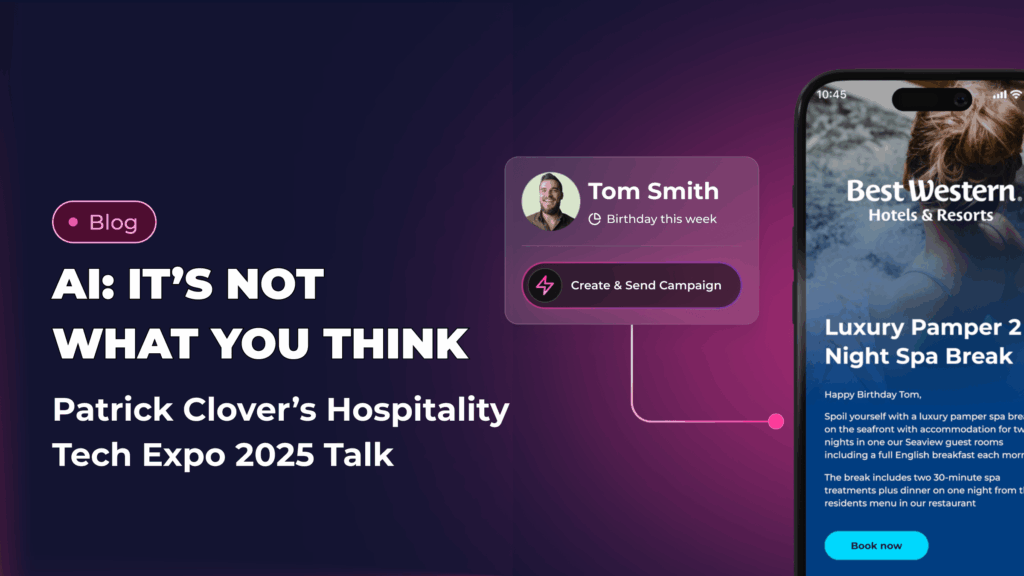
Based on Stampede Founder, Patrick Clover’s, talk at Hospitality Tech Expo 2025. Watch the full talk on Youtube
AI is all the buzz but we need to cut through the noise to find what AI actually is, as it’s not what most people in the hospitality industry try to sell it as.
Many conversations I have with people about AI usually revolve around two main themes: the robots are coming, we’re all going to die, and it’s going to take all of our jobs, and the other is there’s this mysterious oracle that no-one can see, touch or feel and it’s going to solve everybody’s problems. I think both of those are incorrect and not useful in hospitality for positioning the actual role of AI.
So let’s discuss how we can use AI, what it is, and how we can apply it directly within hospitality to ultimately give your businesses the edge and make better daily decisions.
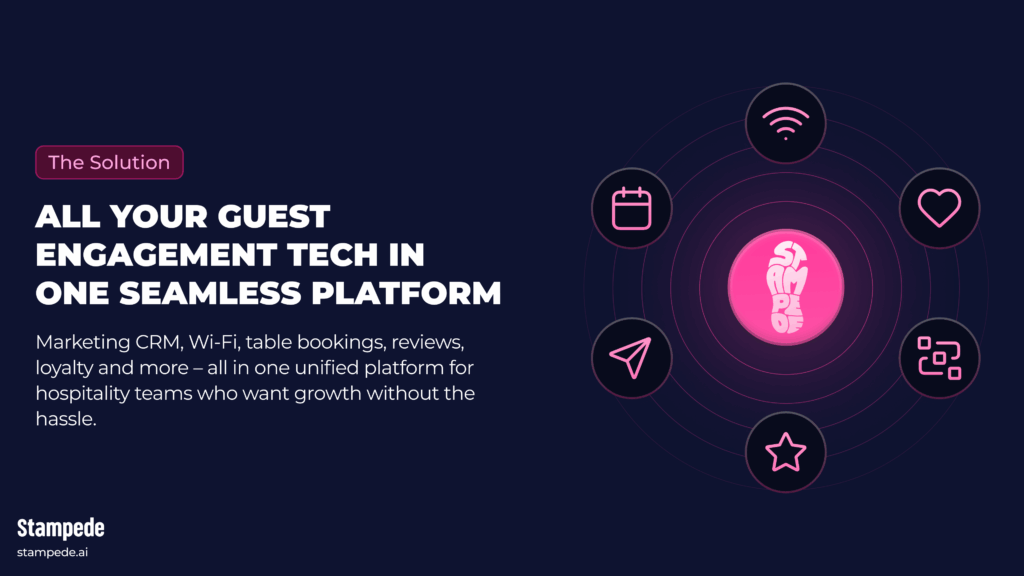
All your guest engagement tech in one seamless platform
So I really believe that hospitality teams, and teams generally, don’t need more technology, we don’t need more tools. We need more connections with our customers. We need tools that are more hyper-connected. And when you have all of these systems working together, e.g. Wi-Fi, Bookings, Reviews, Loyalty, Payments, and CRM, you can finally start to see like what’s happening in your business.
You can start to get a gauge of what your guest journey looks like and the data that you’re collecting becomes really useful. Keep that in mind because the rest of this blog is about patterns and why I think AI is a really phenomenal pattern matcher and what that should mean for your business.
The world of hype: challenging the myths
Calling AI intelligent is really misleading because it isn’t conscious. It doesn’t understand like a human being. It’s statistics, probable outcomes, and pattern recognition that’s happening at scale. And that isn’t bad news.
That’s actually really good news because prediction is exactly what hospitality needs, to know who’s likely to book, who’s dropping off, when will demand spike, and when you should be holding back.
The ordinary world of hospitality
So, in the ordinary world of hospitality, it’s full of these rich patterns. We know that visit clusters all happen around a similar location at a similar time.
Booking volumes follow seasonal curves, so it shouldn’t be any surprise that towards Christmas time you’re getting a lot more big enquiries.
Wi-Fi and Payments tell a really key story about what’s happening with guest behaviour in your business.
Things like menu items, they spike at certain times.
You instinctively know that these patterns are what run hospitality. And that’s not to say that your instinct isn’t valuable, because it really is. So don’t throw away your instinct. Just know that there’s a way of scaling this that is really consistent and allows you to deliver this across 1 to 100 hundred venues without losing the essence of hospitality.
So, wouldn’t it be really great if you had a tool that could surface all of these patterns every day for every venue reliably? That’s really where I think that AI earns its keep. So I want to show you what that would look like in action.
In action
So this is what happens when you let the system do all the heavy lifting. Teams can start to describe their audience in plain English.
E.g. ‘Show me guests who order breakfast regularly’ or ‘Show me first time visitors from last month’.
In seconds, the segment can be built and campaigns can be drafted. That’s hours of human work that’s just been reduced down to minutes and the win here isn’t just speed, it’s consistency.
Staff are spending less time using a variety of disparate tools and they’re spending more time delivering true hospitality – the thing that the guests actually notice.
But how should that change your day-to-day? Let’s explore the practical shifts that this will enable, in more detail.
If the system is connected to all of these things, it can start to spot guests with Birthdays coming up this week and it could automatically suggest a promotion to send out to those people.
It could queue you to politely respond to fresh reviews while the guests still care about your business. It keeps these workflows really tight and simple so that your team can focus on what actually matters. And I think this is the bridge from like “nice idea cool story bro” to “we need to be using this for every single shift”.
Once teams start using this and trusting the prediction, something really magical happens.
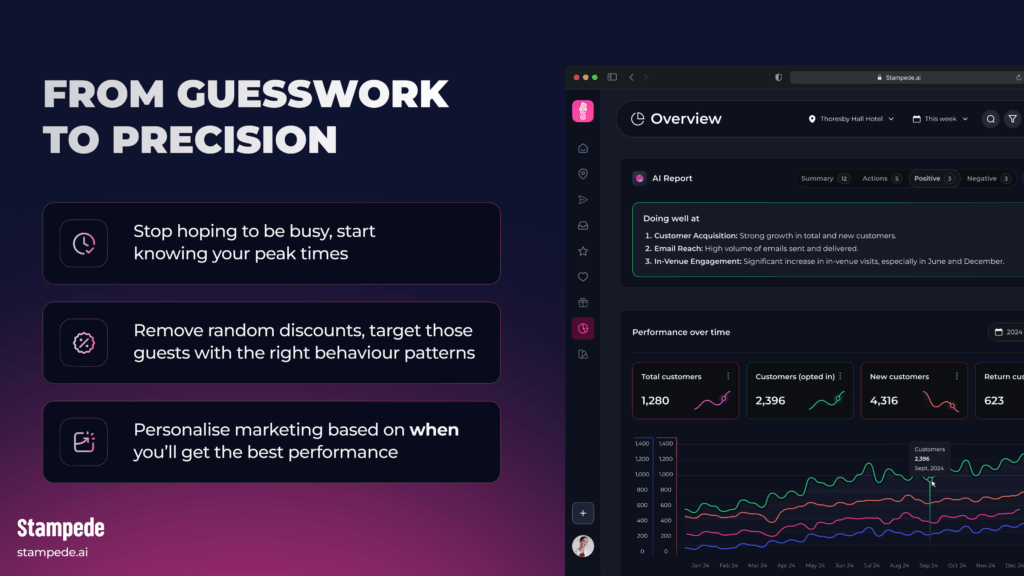
From guesswork to precision
So we move from guesswork and intuition to precision. So we stop hoping to be busy and we know when our peak times are and we can staff accordingly.
We stop blanketing customers with lots of random discounts and we target guests who’s behaviour suggests they will return.
We stop this one size fits all messaging and we send messages when the person is most likely to respond.
And precision, as far as I’m concerned, is actually really addictive because once you’ve felt it, there is just no going back at all.
So how does a system get this smart across so many different parts of the business? Well, that part is really simple because all it actually needs to do is match patterns.
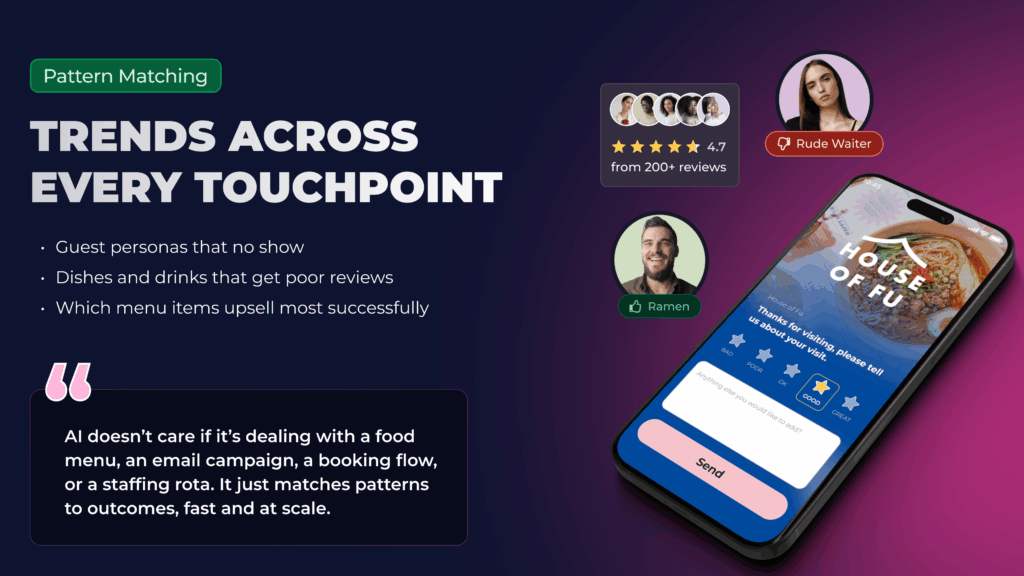
Trends across every touch point
Like AI does not care if your input is a menu, email, booking flow, or staffing rota.
It just matches your patterns to the outcomes that you want to see. It recognises guest personas that tend to no-show, it sees dishes or drinks that correlates with poor reviews, it learns which menu items upsell best, and to who.
There’s no ego, no fatigue, just pattern matching at speed and at scale. And when you have that your culture actually can start to shift.
From reactive to proactive
You stop saying things like, “We wish we knew it was gonna be that busy” and you start saying things like, “There’s three big events this weekend and we are ready”.
You stop lamenting, “We’re not getting any big group enquiries anymore”, and you start repeating, “That promotion worked, let’s do it again but this time smarter”.
That’s the shift. You go from being reactive to proactive. And here’s the great part about it: you don’t need moonshots to win. Small steady gains really compound.
All you need to do is be 0.1% better than we were yesterday. It’s not about ripping out lots of things, turning up all the tables. It’s about small incremental gains.
Even small gains add up
Hospitality runs on tight margins. You don’t need perfection, you just need AI to be useful. You need to be able to predict things like your supplier costs, whether they’re up or down, your quiet or busy spells, and your staff cover needs.
You need to be able to prepare, quickly update your rota, plan marketing, and get your team ready. You also have to prevent things like suppliers shortages, food waste and missed opportunities. Those small improvements every day, every shift, add up fast.
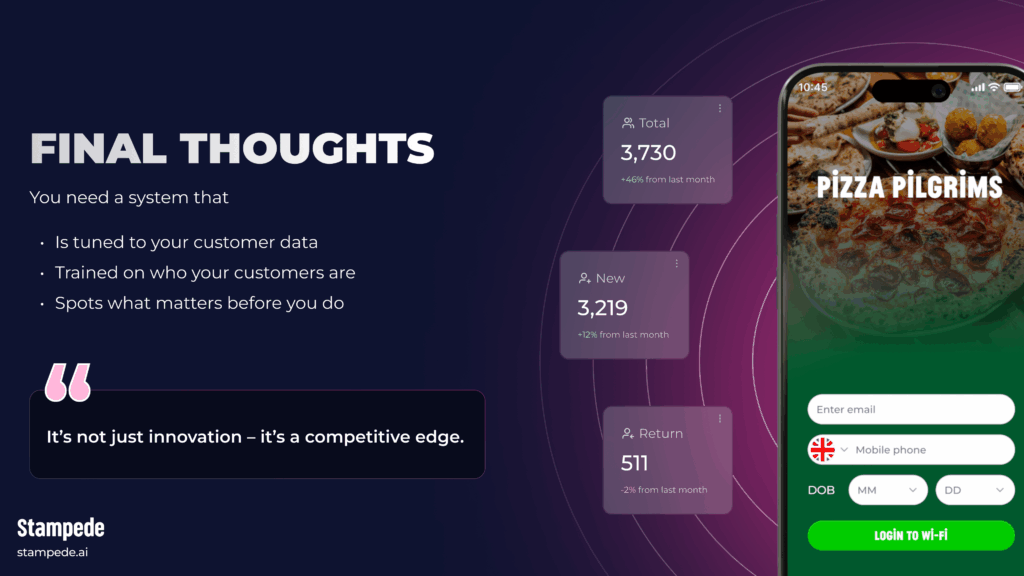
Final thoughts
So, in my opinion, I don’t think you need a robot waiter or a sentient concierge.
You need a system that’s really tuned to your data, trained on your customers, and can spot what matters before you can.
That’s all AI is. It’s a great pattern matcher. And in hospitality, I think that’s your edge.
See hospitality AI in action with Stampede’s guest engagement tech all in one seamless platform.
Search
Popular posts
Sign up to our newsletter